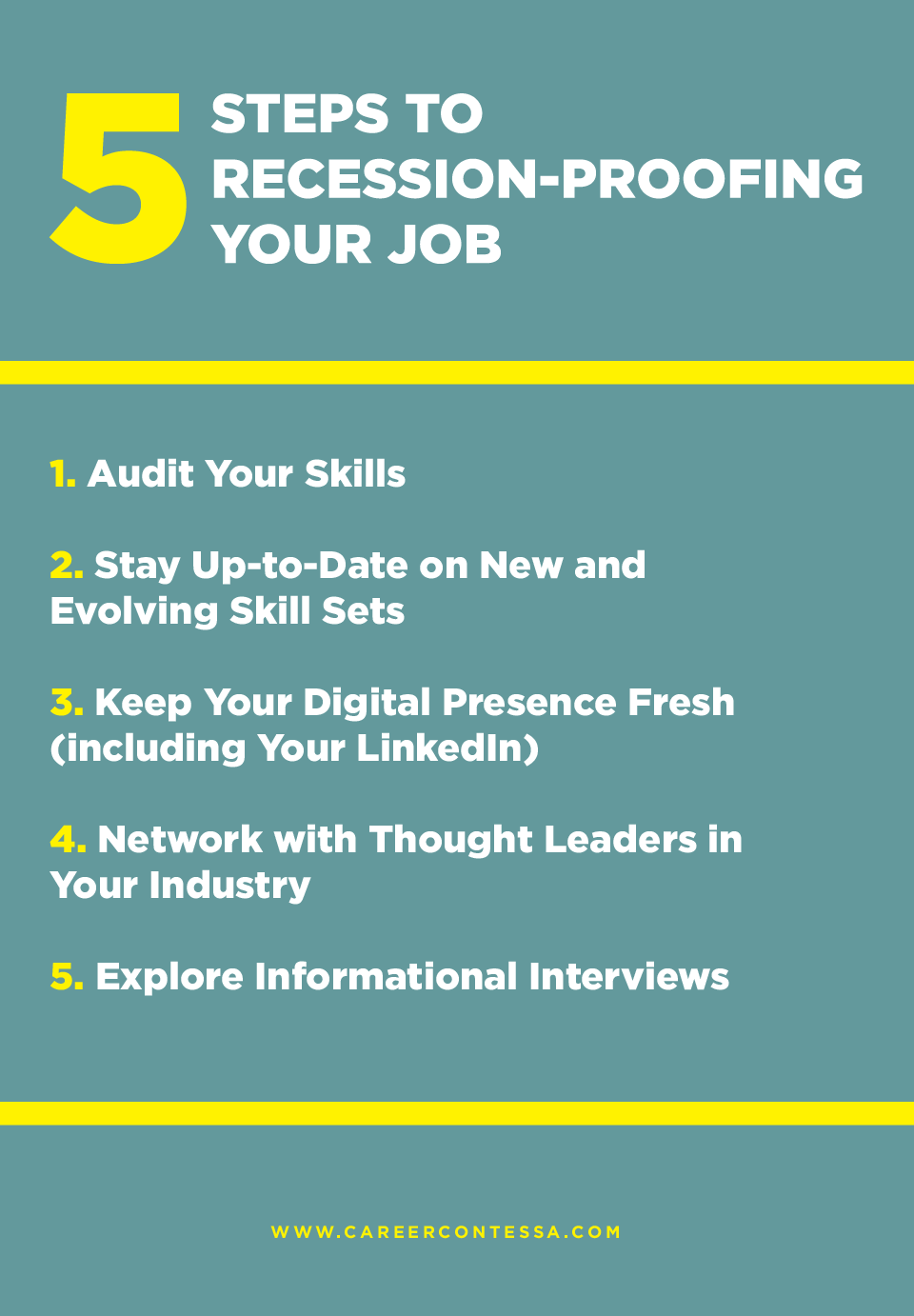Recession is a scary word.
Whether the economy is currently in one or a recession is looming, it’s not something people like to add to their list of experiences. When there’s talk of recession, it’s often followed by words like
layoffs, furloughs, and job loss (cue the panic and anxiety). So, how can you keep your job when there’s talk of terminations? Is your career "safe" in the case of an economic downturn?
While job security is never fully guaranteed, there are steps you can take to
recession-proof your job and arm your arsenal of expertise with recession-proof job skills. But first, let’s start at the beginning.
What Is a Recession?
As defined by
The National Bureau of Economic Research (NBER),
a recession is a significant decline in economic activity spread across the economy, normally visible in production, employment, and other indicators. NBER is recognized as the authority that determines the starting and ending dates of a recession. A recession is also referred to as the period between when the economy reaches a peak of economic activity and when the economy reaches its trough.
This business cycle contraction typically occurs when there is a financial crisis, a large-scale natural disaster, the bursting of an economic bubble, external trade shock, adverse supply shock, or a pandemic, like
COVID-19. When the U.S.
experiences two consecutive quarters of declining Gross Domestic Product (GDP), we’re in a recession. This contraction two quarters in a row suggests underlying economic issues.
What Are Recession-Proof Job Skills?
Keeping our skills fresh is key to growing our careers during both times of economic success and economic uncertainty. While not all jobs are recession-proof, there are some job skills that are.
Transferable Skills
The most important tools you can carry in your skillset are transferable skills. These areas of expertise can be used in numerous roles, industries, and organizations. Transferable skills are more important than your job title because they show you can get a job done or a problem solved even if you’ve never encountered the exact situation before. They’re the sweet spot of recession-proof job skills. Taking your existing skills and creatively applying them to other scenarios will set you apart from your peers and allow you to be an immediate asset to your team.
Soft Skills
It’s been said that only 15 percent of your professional success is related to your technical proficiency and knowledge. The other 85 percent of your success is based on your soft skills.
Soft skills are the non-technical skills that relate to how you work. This includes your
interpersonal skills, communication skills, and social skills, among others.
Soft skills are essential because your coworkers likely share the same technical proficiencies and expertise as you; that’s why they got the job. So, the soft skills you possess will set you apart. Bonus: soft skills are transferable skills because no matter what position you hold or company you work for, your soft skills are imperative to your success.
In regards to networking, 85 percent of people found their job through networking, according to
a survey conducted by Performance-Base Hiring Learning Systems. Establishing a solid network, and equally as important, staying connected with your network, is a skill that is relevant in all economic situations. When you have a strong network, your odds of securing a job are that much higher. If you’re not sure where to start, check out
these networking basics.
Technology Skills
Keeping up-to-date with the latest technology is important to stay relevant in the job market. Doing so during a recession will help you show your value to your current employer and help make you more marketable to potential employers. Establish familiarities with common communication and team management software, like Slack, Asana, and Trello. Learn to code, gain experience with a content management system, or establish new web development skills.
What Are Typically Recession-Proof Jobs?
Let’s start by saying that no job is ever 100% recession-proof.
That being said, there are a lot of jobs that are safer than others when a recession strikes. Recession-proof jobs are those whose industries are less likely to be impacted when there’s a downturn in the economy or professions that are essential regardless of the status of the economy.
Some common recession-proof jobs include the following professions.
Medical Professionals
People will always get sick and need medical attention, so health care workers are constantly in demand. Healthcare jobs like doctors, nurses, and physician’s assistants are often unaffected by recessions because of their area of expertise.
This also means that the positions that support medical professionals, like administrators, janitors, receptionists, and other nonmedical workers, are likely to have safety in their roles in the medical industry compared to other industries.
Teachers and Professors
Unlike businesses, schools don’t close during a recession. Children still need an education, and additionally, adults still have the option to further theirs. Teachers, administrators, and those who support educators are generally recession-proof jobs.
Social Workers
Due to the nature of social work, positions held in the industry are generally recession-proof. People will always need help coping with and solving problems in their everyday lives. Specifically, medical, clinical, and private practice social workers have a higher degree of job safety during difficult economic times.
Mental Health Professionals
During times of economic uncertainty, stress and anxiety are at an all-time high, which means mental health professionals are more in-demand than ever.
The increase in stress can lead to more mental health problems, marital problems, emotional abuse problems, and substance abuse problems. Recession-proof jobs in this industry include psychologists, psychiatrists, counselors, and therapists.
Elder Care and Hospice Care Workers
People who care for senior citizens and the sick have relatively recession-proof jobs because care still needs to be provided to those that were in assisted living care before a recession hits. According to the
Bureau of Labor Statistics, health care positions specializing in elder care are expected to increase by 15% by 2029.
The same logic applies to those who were in hospice care pre-recession and those that need to enter into care during a recession.
Accountants and Auditors
During a recession, money may be uncertain, but taxes are forever. While nothing is a guarantee, financial jobs are a pretty secure bet.
The need to file a tax return every year remains regardless of the condition of the economy. Along the same lines, auditors for the IRS and those that work at and for publicly traded companies are needed to ensure compliance with financial regulations.
Accountants, Certified Public Accountants, and auditors are typically recession-proof positions.
Actuaries
Actuaries analyze business risk, which during economic crises, is more important than ever, making it a pretty recession-proof job.
Legal Professionals
Legal professionals, like attorneys, lawyers, arbitrators, legal assistants, and paralegals, are typically recession-proof jobs. Especially during periods of extreme economic and financial stress, divorce attorneys and bankruptcy attorneys are often in high demand.
Pharmacists
People need their medication and prescriptions filled no matter the state of the economy.
IT Workers
IT workers, especially those that assist other generally recession-proof jobs, are needed to keep business (and, more importantly, the Internet) up and running. Positions like network administrators, programmers, developers, project managers, systems analysts, and other IT specialists are specialized roles that are needed to keep day-to-day activities running smoothly.
Grocery Store Workers
Recessions usually mean more home-cooked meals and fewer dinners out. Those that work at grocery stores and support grocers can generally count on keeping their job during a recession.
Veterinarians
Similar to how doctors are in need to care for people, veterinarians are in need to care for pets. Some might see vet wellness visits as an expense that can be put off when money is tight, but they’ll be happy to pay for veterinarians' expertise if a pet gets sick or injured.
Utility Workers
They keep the lights on, literally. Services that provide electricity, water, sewer, natural gas, phone, and Internet services, are in demand during a recession to keep our everyday lives functioning.
Public Transportation Workers
We still need to get from point A to point B, and public transportation helps get us there, even during a recession.
5 Steps to Recession-Proofing Your Job
Most jobs are not guaranteed, but there are steps you can take to recession-proof your job. Here are five we recommend.
1. Audit Your Skills
Take a look at both your hard and
soft skills. Where are there opportunities to develop, and what skills are transferable? Understanding where you stand in relation to current skills and what you can do to better your skillset will serve invaluable to your work.
2. Stay Up-to-Date on New and Evolving Skill Sets
Stay ahead of the curve when it comes to relevant skills for your position. Subscribe to industry newsletters, read relevant news articles, or enroll in
continuing education. If your skills are top-notch, this can set you apart from your peers if there’s talk of layoffs.
In addition to keeping your skills sharp, keep an eye on occupations with expected job growth. While the tech industry continues to see growth, there is also a growing need for skilled laborers like plumbers, mechanics, and electricians.
3. Keep Your Digital Presence Fresh (Including Your LinkedIn)
If you’re nervous about your current position and want to put your feelers out in the job market, make sure your digital presence is up to date.
Update your LinkedIn, website, or personal social media to ensure it accurately reflects your experience in case opportunities should arise.
4. Network with Thought Leaders in Your Industry
Networking is a key recession-proof job skill. By reaching out to connect with thought leaders, you’ll gain insight into different aspects of your industry, and you’re likely to discover opportunities that you wouldn’t have become aware of on your own.
This is also why it’s important to network even when you’re not looking for a job. Maintaining relationships and keeping a pulse on your industry with thought leaders could unlock possibilities for your career.
5. Explore Informational Interviews
In the same vein as networking,
informational interviews are an effective way to learn about your industry, other industries and companies, and different roles. You don’t have to be looking for a new job to learn about someone else’s.
Informational interviews are a powerful tool for your career development because they allow you to gather information and learn about areas that may interest you without the stress of a typical interview.














